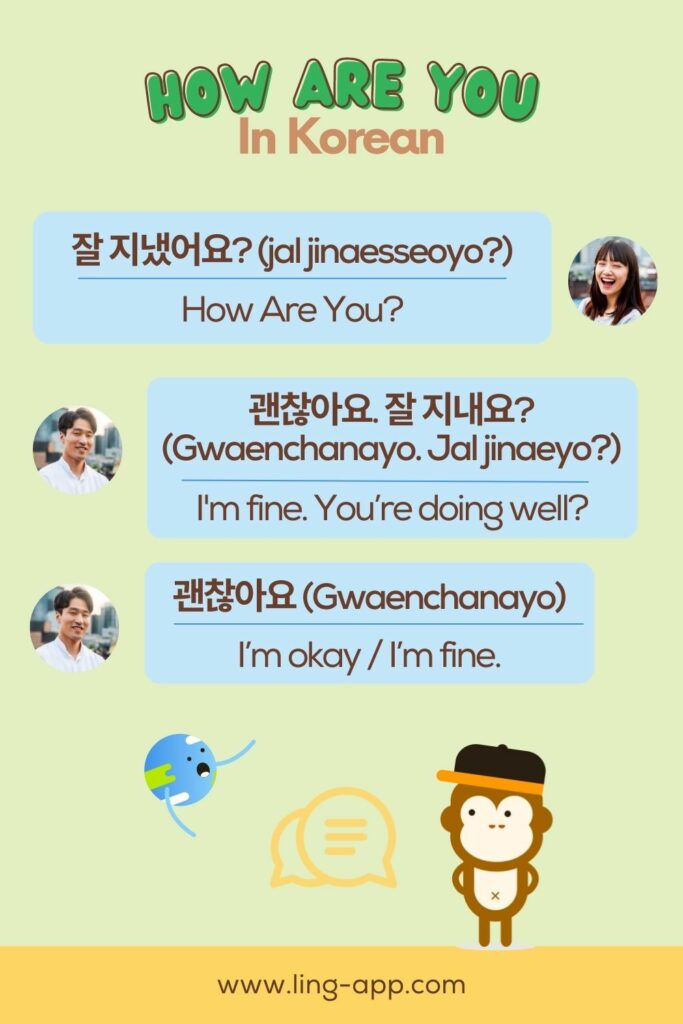
Learning how to greet someone in a different language can be a fun and rewarding experience. In Korean culture, greetings play a significant role in daily interactions. One of the most common greetings that you might want to learn is “How are you?” In Korean, this phrase can be expressed in various ways depending on the formality and politeness level you want to convey.
Formal Way to Say “How Are You?” in Korean
If you want to ask someone how they are in a formal setting or with someone older or in a position of authority, you can use the phrase “어떻게 지내세요?” (eotteohke jinaeseyo). This phrase shows respect and politeness, making it suitable for professional environments or when talking to elders.
Here is a breakdown of the phrase:
| 어떻게 | How |
| 지내세요 | Are you? |
When using this phrase, it is essential to maintain a respectful tone and demeanor to show your sincerity and politeness.
Informal Way to Say “How Are You?” in Korean
For informal situations or when talking to friends, family, or someone younger than you, you can use the phrase “어떻게 지내?” (eotteohke jinae). This version is less formal and more casual, suitable for everyday conversations with people you are close to.
Breaking down the informal phrase:
| 어떻게 | How |
| 지내 | Are you? |
Using the informal version of “How are you?” can help you build a more relaxed and friendly rapport with those you are conversing with.
Other Ways to Ask “How Are You?” in Korean
In addition to the formal and informal versions, there are other ways to ask “How are you?” in Korean based on the level of politeness you wish to convey:
- 최근 어떻게 지내고 있어요? (choegeun eotteohke jinaego isseoyo) – This is a polite way to ask how someone has been doing recently.
- 잘 지내고 있어요? (jal jinaego isseoyo) – A polite way to ask if someone is doing well.
- 어떻게 지내? (eotteohke jinae) – An informal way to ask how someone is doing.
- 잘 지내? (jal jinae) – An informal and casual way to ask if someone is doing well.
By learning these variations, you can adapt your greetings based on the context and relationship you have with the person you are speaking to.

Credit: www.youtube.com

Credit: ling-app.com
Cultural Importance of Greetings in Korea
In Korean culture, greetings hold significant importance as they reflect respect, politeness, and the relationship between individuals. When you take the time to learn how to greet someone properly in Korean, you show your interest in the language and culture, which can help you establish meaningful connections with native speakers.
Whether you are traveling to Korea, interacting with Korean friends, or simply have an interest in the language, mastering basic greetings like “How are you?” can enhance your communication skills and enrich your cultural experiences.
Practice Makes Perfect
Practice saying “How are you?” in Korean in different contexts to become more comfortable with the language. The more you practice, the more natural and confident you will become in using Korean greetings.
Remember that language learning is a journey, and making an effort to learn and use greetings like “How are you?” shows your willingness to engage with the Korean language and culture.
So, whether you opt for the formal “어떻게 지내세요?” or the informal “어떻게 지내?”, your efforts to greet others in Korean will be appreciated and reciprocated, fostering positive interactions and connections.
Start incorporating these phrases into your daily conversations and enjoy the process of learning and engaging with the Korean language!
Frequently Asked Questions
What Is The Basic Greeting In Korean?
The basic greeting in Korean is “Annyeonghaseyo” which means “Hello” in English.
How Do You Say “how Are You?” In Korean?
“How are you? ” In Korean is “Jal jinaess-eoyo? ” Or “Eotteohke jinaess-eoyo? “.
Can You Use Informal Language To Ask “how Are You?” In Korean?
Yes, you can use informal language to ask “How are you? ” In Korean by saying “Jal jinae? ” Or “Eotteohke jinae? “.
How Do You Respond To “how Are You?” In Korean?
You can respond to “How are you? ” In Korean by saying “Jal jinaess-eoyo” or “Eotteohke jinaess-eoyo” to indicate that you are doing well. Alternatively, you can say “Bappeusseumnida” to indicate that you are busy.
Curious about musical instruments? Check out our detailed guide: “How Many Strings Does a Banjo Have? Unveil the Incredible Mystery!”





One Comment